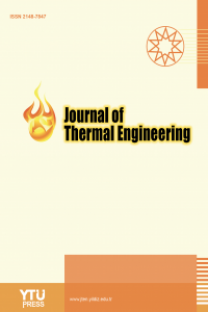EXPERIMENTAL STUDY OF HYDROCARBON R290 IN WATER COOLER REFRIGERATION SYSTEM
Hydrocarbon, R290 Flammable Refrigerant, Water Cooler,
___
- [1]Calm JM. Emissions and environmental impacts from air-conditioning and refrigeration systems. International Journal of Refrigeration, 2002; 25(3): 293-305, https://doi.org/10.1016/S0140-7007(01)00067-6.
- [2]Calm JM, Hourahan GC. Refrigerant data summary. Eng Syst 2001; 18(11): 74 -888.
- [3]Lemmon EW, Huber ML, McLinden MO. NIST Standard Reference Database 23: Reference Fluid Thermodynamic and Transport Properties (REFPROP), Version 9.0. Phys Chem Prop, 2010.
- [4] Emerson Climate Technologies. Refrigerant choices for commercial refrigeration, 2010.
- [5] Purkayastha B, Bansal PK. An experimental study on HC290 and a commercial liquefied petroleum gas (LPG) mix as suitable replacements for HCFC22. International Journal of Refrigeration 1998; 21:3-17. doi: 10.1016/S0140-7007(97)00083-2.
- [6] Zhou G, Zhang Y. Performance of split type air conditioner matched with coiled adiabatic capillary tubes using HCFC22 and HC290. Applied Energy 2010; 87:1522-8, doi.org/10.1016/j.apenergy.2009.10.005.
- [7] Devotta S, Padalkar AS, Sane NK. Performance assessment of HC290 as a drop in substitute to HCFC22 in a window air conditioner. International Journal of Refrigeration 2005; 28:594-604, doi:10.1016/j.ijrefrig.2004.09.013.
- [8] Yu CC, Teng TP. Retrofit assessment of refrigerator using hydrocarbon refrigerants. Applied Thermal Engineering 2014; 66(1):507-518, https://doi.org/10.1016/j.applthermaleng.2014.02.050.
- [9]Indian Standards B. IS 1475-1 (2001): Self-Contained Drinking Water Coolers, Part 1: Energy Consumption and Performance, 2001.
- [10] IEC60335-2-34 Household and similar electrical appliances, 2012.
- [11] Granryd E. Hydrocarbons as refrigerants - an overview. International Journal of Refrigeration, 2001; 24(1): 15-24 https://doi.org/10.1016/S0140-7007(00)00065-7.
- [12] Palm B. Hydrocarbons as refrigerants in small heat pump and refrigeration systems - A review. International Journal of Refrigeration, 2008; 31( 4) : 552-563, https://doi.org/10.1016/j.ijrefrig.2007.11.016.
- [13] M. M. Rahman H H. Y. Rahman K. Subramaniam. Hydrocarbon as Refrigerant for Domestic Air Conditioner: A Comparative Study between R22 and R290. Elixir Thermal Engineering 2012; 53: 11976-11979.
- [14] He MG, Song XZ, Liu H, Zhang Y. Application of natural refrigerant propane and propane/isobutane in large capacity chest freezer. Applied Thermal Engineering 2014;70:732–6. https://doi.org/10.1016/j.appltherma leng.2014.05.097.
- [15] Park KJ, Seo T, Jung D. Performance of alternative refrigerants for residential air-conditioning applications. Applied Energy 2007; 84(10): 985-991, https://doi.org/10.1016/j.apenergy.2007.05.002.
- [16] Jwo CS, Ting CC, Wang WR. Efficiency analysis of home refrigerators by replacing hydrocarbon refrigerants. Measurement 2009; 42(5): 697-701, https://doi.org/10.1016/j.measurement.2008.11.006.
- [17] Jung D, Kim CB, Song K, Park B. Testing of propane/isobutane mixture in domestic refrigerators. International Journal of Refrigeration, 2000; 23(7): 517-527, https://doi.org/10.1016/S0140-7007(99)00084-5.
- [18] Bhatkar VW, Kriplani VM, Awari GK. Experimental performance of R134a and R152a using microchannel condenser. Journal of Thermal Engineering 2015;1:575–82. https://doi.org/10.18186/jte.55930.
- [19] Chopra K , Sahni V , Mishra R . Energy, Exergy and Sustainability Analysis of Two-stage Vapour Compression Refrigeration System. Journal of Thermal Engineering. 2015; 1(4): 445-440.
- Yayın Aralığı: 6
- Başlangıç: 2015
- Yayıncı: YILDIZ TEKNİK ÜNİVERSİTESİ
Amit SHARMA, Arun GUPTA, Hardial SINGH
N. Alpay KÜREKCİ, Mehmet ÖZCAN
Iman ZAHMATKESH, Razieh Akhlaghi ARDEKANI
PERFORMANCE AND ECOLOGICAL OBJECTIVE INVESTIGATION OF TWOSTATE IRREVERSIBLE QUANTUM HEAT ENGINE
Emin AÇIKKALP, Mohammad H. AHMADI
COMPARATIVE MAXIMUM POWER DENSITY ANALYSIS OF A SUPERCRITICAL $CO_2$ BRAYTON POWER CYCLE
